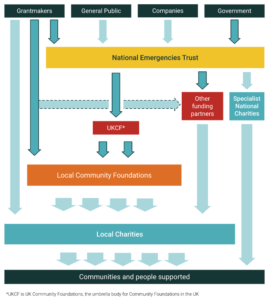Regranting consultation
Consultation on proposed changes to the 360Giving Data Standard as a result of research into regranting and multi-funder collaborations
Over the past three months, 360Giving has been exploring issues related to regranting and multi-funder collaboration. We published a blog on the topic which you can read here.
This consultation sets out the details of a proposed update to the 360Giving Data Standard arising from this research and implications of those changes, and invites feedback from our stakeholders via our survey (which should take no longer than ten minutes). The deadline is at 5pm on Friday 6th May.

Regranting type codelist
We are proposing a new classification, Regranting Type, which will allow funders to identify the grants they give out for redistribution or as part of multi-funder collaborations.
Why is this new classification being proposed?
The regranting classification allows funders to show when a grant is intended for onward distribution, or part of a multi-funder collaboration.
In published 360Giving data, it is not currently possible to distinguish between grants that are going to an intermediary or directly to an end recipient, or between grants that are one part of a programme or initiative involving multiple funders. It is hoped that this classification will help to increase the visibility of regranted funds, allowing funders to provide more useful context about their grants, 360Giving tools to flag regranting, and users to analyse the data more accurately.
The classification allows funders to indicate, for example, if a grant is part of a match funding initiative or other funder collaboration, an endowment to establish a new grantmaker or given to a fiscal sponsor acting as an agent for the funder. The classification of types of regrant and terms used have been identified through interviews with funders, research into published 360Giving data and desk research by 360Giving staff members.
The classification would apply at the level of an individual grant. It may be useful for funders who publish grants intended for regranting and grants that form part of multi-funder collaborations.
Impact on existing publishers and users of the 360Giving Data Standard
The proposed change would introduce a new optional codelist in the 360Giving Data Standard, which means it is a backwards compatible change, known as a MINOR update. You can read about the governance and revision control process for the Standard here.
When can we expect to see this change rolled out?
Subject to a successful consultation, we expect to be able to implement this new codelist in the Standard by summer 2022.
We’d love to hear from you about whether this classification would be useful – have your say by completing our consultation form below. And please do share this consultation with any person or organisation which is interested in understanding open data on regranting better.
Other ideas we’ve considered
Our research into the topic of regranting and multifunder collaborations prompted us to consider a range of ways to allow funders to identify when their grants are for regranting. We are proposing the introduction of a classification that can be applied at grant level because we think it provides the right balance of simplicity to use for funders and users, while allowing for some nuances about the type of regrant or multi-funder collaboration.
We also considered the following options:
- A new ‘Regrant’ field with TRUE/FALSE value to flag any grant as for regranting
This is the simplest approach but we do not plan to take this idea forward because it would provide less useful information than a codelist, and would lead to potential ambiguity for any grants which weren’t labelled either TRUE or FALSE. - A new field to allow for the whole award amount contributed by multiple funders for a joint project or activity, alongside a single funder’s contribution
Although potentially useful in multi-funder partnerships or collaborations, introducing this field could result in discrepancies in the “total pot” amount reported by different publishing organisations. It is reasonable to expect funders to publish information about their own contributions but not to be responsible for the accuracy of information belonging to third parties. - A way to link grant awards
This would allow funders to link their grants to other published grants data, to show in detail how funding is flowing between different organisations. Such a solution could be used to achieve a level of ‘traceability’ for money passing through the funding ecosystem; however it would require a high level of coordination between funders publishing their data, and so we have decided not to explore this further. However the 360Giving Data Standard already includes a ‘Related Activity’ field which can be used to refer to other grant identifiers, which could be used by motivated funders to link their grants. - A new way to indicate other funder(s) involved in a regranting or multi-funder relationship
This would allow funders to indicate how another funder was related to their funding activity, providing a “role type” to indicate, for example, if they are the origin of the funds, co-funder or a distributing funder. This mechanism would allow funders to capture more nuance about their funding relationships and would allow funders that are recipients of funds for regranting to publish data about their funding contributors. We think this is an idea that merits further exploration; however we are prioritising the introduction of a grant-level solution first in order to make progress on the issues caused by regranted funds. We would like to explore this option further in future.
Have your say
Complete our survey here 360Giving Consultation Survey – Regranting
